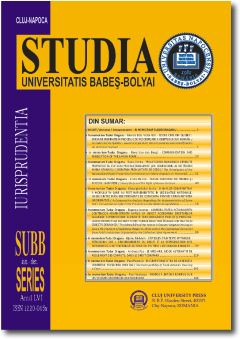CAROL I OF ROMANIA - A LORD/KING WHO REIGNED AND RULED. THE FORMULA OF THE DUALIST PARLIAMENTARY REGIME TRANSPLANTED IN 1866
CAROL I OF ROMANIA - A LORD/KING WHO REIGNED AND RULED. THE FORMULA OF THE DUALIST PARLIAMENTARY REGIME TRANSPLANTED IN 1866
Author(s): Răzvan Cosmin RoghinăSubject(s): History of Law
Published by: Studia Universitatis Babes-Bolyai
Keywords: Romania; constitutional transplant; 1866; Romanian Constitution of 1866; Belgian Constitution of 1831; dualist parliamentary regime; head of state authoritarianism in Romania;
Summary/Abstract: In this paper, we intend to clarify the theoretical practices supposed by the political regime transplanted by the Romanian political elite in the constitutional moment of 1866, from the Belgian Constitution of 1831. From the perspective of such an approach, we shall observe that the fundamental law of 1866 did not design a Domn (Lord)/King placed under the dictum ‘the monarch reigns, but he does not rule’, but an active head of state, constitutionally endowed with strong levers of power. Considering the Constituent’s desire to give a reply to the authoritarian regime of A. I. Cuza, the recognized constitutional powers of the head of state, on the one hand, and the further developed political status of Carol I within the political and constitutional praxis, on the other hand, emphasizes the weaknesses and incapacities of the Romanian political class regarding the dimension of the head of state constitutional institution. We shall emphasize the role and powers of the Lord (Domn) in the formula of the dualist parliamentary regime, which was not fully understood by the Constituent and by the political class that afterwards exercised the fundamental law. A dualist parliamentary regime formula inevitably involves a head of state that reigns and rules. The path towards a monist parliamentary regime, which was much more compatible with the Constituent desires (as aversions and aspirations), should have been provoked, in practice, by the representatives of the People. The dualist parliamentary regime – as an archetype of the political thinking of that era – was, in part, customary. The later character implies experience, knowledge, which the Romanian society, through its legal and political actors, did not have.
Journal: Studia Universitatis Babes Bolyai - Iurisprudentia
- Issue Year: 64/2019
- Issue No: 4
- Page Range: 119-151
- Page Count: 33
- Language: English

